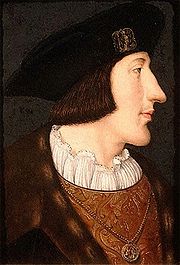
Charles III, Duke of Savoy
Encyclopedia

He was the younger son of Philip (Filippo) the Landless, an aged younger son of the ducal family, and his second wife Claudine de Brosse
Claudine de Brosse
Claudine de Brosse , was a Duchess Consort of Savoy; married in 1485 to Philip II, Duke of Savoy.Issue:# Charles III who succeeded his half-brother as Duke of Savoy# Louis # Philip , duke of Nemours...
of the family that unsuccessfully claimed the Duchy of Brittany. His grandparents were Duke Louis of Savoy and Anne of Cyprus
Anne of Cyprus
Anne of Cyprus was the daughter of King Janus of Cyprus and Charlotte de Bourbon; and a member of the celebrated Lusignan crusader dynasty...
. As a child, there were next to no expectations for him to succeed to any monarchy. He was christened as a namesake of the then-reigning Duke, Charles I of Savoy
Charles I of Savoy
Charles I , surnamed the Warrior, was the Duke of Savoy from 1482 to 1490 and titular king of Cyprus, Jerusalem, and Armenia from 1485 to 1490....
, the Warrior, his first cousin.
However, when he was ten years old, his father unexpectedly succeeded his grandnephew Charles II of Savoy as duke and head of the Savoy dynasty, which had now also received the titles of the kingdoms of Cyprus, Jerusalem and Armenia. However, Charles's father was not the heir general of the deceased duke, only the male heir. Jerusalem, Cyprus and certain other claims and possessions could go to a different heir, and they did, in principle. Charles's father was not ready to relinquish those, and he took such titles to his own titulary, staking a claim.
In 1497, Charles's half-brother Philibert the Handsome succeeded their father as Duke of Savoy, etc. Philibert however died childless in 1504, surprisingly, and now Charles succeeded, at age eighteen.
After 1499, the de jure rights of Jerusalem and Cyprus were lost to the Savoy family. Charles however, as some sort of heir-male, took those titles, which his successors also used. In 1713, Charles's great-great-great-grandson Victor Amadeus II of Savoy received confirmation to that title from the Kings of Spain and France, who also claimed it. The rights, according to succession of heirs general, i.e. not excluding female lines, had gone, until Charles's death, to the French lords of La Tremoille, Princes of Talmond and Taranto.
Charles was allied with the Habsburg camp in Western European politics, where Francis I of France
Francis I of France
Francis I was King of France from 1515 until his death. During his reign, huge cultural changes took place in France and he has been called France's original Renaissance monarch...
and Emperor Charles V battled for ascendancy. He married Beatrice of Portugal (1504–1538), daughter of Manuel I of Portugal
Manuel I of Portugal
Manuel I , the Fortunate , 14th king of Portugal and the Algarves was the son of Infante Ferdinand, Duke of Viseu, , by his wife, Infanta Beatrice of Portugal...
and both first cousin and sister-in-law of the Emperor.
They had nine children, but only one child Emanuele Filiberto reached adulthood:
- Adriano Giovanni Amadeo, Prince of Piedmont (19 November 1522-10 January 1523)
- Ludovico, Prince of Piedmont (4 December 1523-25 November 1536)
- Emanuele Filiberto, Duke of Savoy (8 July 1528-30 August 1580), married Marguerite, Duchess of Berry, sister of Henri II, King of FranceHenry II of FranceHenry II was King of France from 31 March 1547 until his death in 1559.-Early years:Henry was born in the royal Château de Saint-Germain-en-Laye, near Paris, the son of Francis I and Claude, Duchess of Brittany .His father was captured at the Battle of Pavia in 1525 by his sworn enemy,...
- Caterina (25 November 1529-May 1536)
- Maria (12 June 1530-1531)
- Isabella (May 1532-24 September 1533)
- Emanuele (May 1533-died young)
- Emanuele (May 1534-died young)
- Giovanni Maria (3 December 1537-8 January 1538)
The French invaded his duchy several times, and held almost all of his possessions from 1536 onwards. Thus duke Charles was one of the greatest losers in those struggles of the mighty, the small who was left crushed. He spent the rest of his life practically in exile, at the mercy of relatives.
He was the duke who imprisoned François Bonivard
François Bonivard
François Bonivard was a Swiss patriot and historian whose life was the inspiration for Byron's 1816 poem The Prisoner Of Chillon....
, the "prisoner of Chillon" in 1530.

